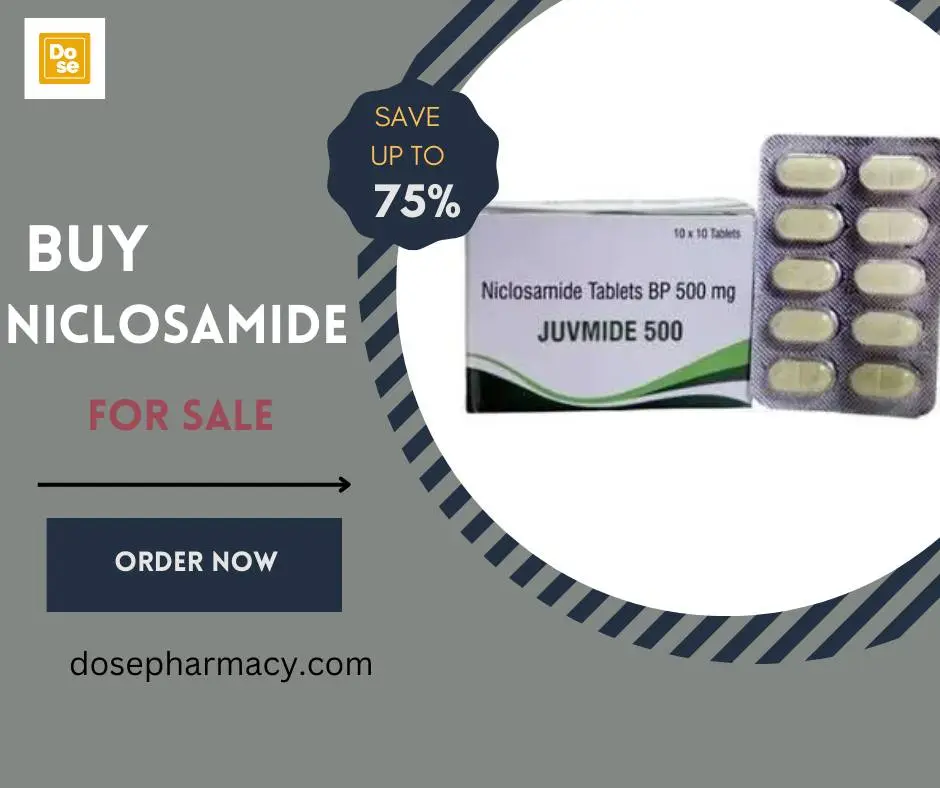Niclosamide 500 mg is a trusted medication used to treat parasitic infections, particularly those caused by tapeworms. This drug has been a cornerstone in combating intestinal parasites, providing relief and improving the quality of life for individuals worldwide. While its use is relatively straightforward, understanding how to use it properly ensures optimal results and reduces the risk of side effects. Let’s explore niclosamide in detail, including its purpose, usage, precautions, and tips for effective administration.
What is Niclosamide?
Niclosamide is an antiparasitic medication primarily prescribed to treat tapeworm infections. It works by disrupting the energy metabolism of the parasite, causing it to lose its ability to survive within the host’s intestines. The dead parasites are then expelled naturally through bowel movements. This drug is included in the World Health Organization’s list of essential medicines due to its proven efficacy and safety profile.
Conditions Treated by Niclosamide
Niclosamide is effective against:
- Tapeworm Infections
- Includes beef, pork, fish, and dwarf tapeworms.
- Commonly caused by consuming undercooked or contaminated food.
- Hymenolepiasis
- An infection caused by the Hymenolepis nana (dwarf tapeworm).
- Off-Label Uses
- Recent studies are exploring its potential in managing other conditions, such as viral infections and certain types of cancer, but these applications require further research.
How to Use Niclosamide Properly
To achieve the best results, it’s crucial to follow your healthcare provider’s instructions. Here’s a step-by-step guide:
1. Dosage
- Adults and Children: The dosage varies depending on the type of tapeworm infection and the patient’s age. Typically, niclosamide is taken as a single dose or divided over a short period.
- Standard Dosage for Tapeworms: Adults usually take a 2-gram dose, while children’s doses are adjusted based on weight.
2. Administration
- Take niclosamide tablets on an empty stomach to enhance absorption.
- Chew or crush the tablets thoroughly before swallowing, then drink a full glass of water. For young children, the tablets can be dissolved in water for easier administration.
3. Timing
- Niclosamide is often taken as a single-day treatment. However, follow-up treatments may be recommended in some cases to ensure complete elimination of parasites.
Precautions While Using Niclosamide
Using niclosamide correctly also involves being aware of certain precautions:
1. Consult a Healthcare Professional
- Ensure the medication is appropriate for your condition.
- Inform your doctor about any allergies, ongoing medications, or medical conditions before starting treatment.
2. Avoid Self-Medication
- While niclosamide is effective, self-diagnosing and treating parasitic infections can lead to incomplete treatment or complications.
3. Pregnancy and Breastfeeding
- Niclosamide is generally considered safe for pregnant and breastfeeding women, but always consult a doctor before use.
4. Drug Interactions
- Niclosamide has minimal drug interactions, but inform your doctor about any other medications or supplements you are taking to avoid potential issues.
Possible Side Effects
Niclosamide is well-tolerated, but like any medication, it may cause side effects in some individuals. Common side effects include:
- Nausea
- Vomiting
- Abdominal pain
- Diarrhea
These symptoms are usually mild and resolve on their own. However, if severe reactions occur, such as difficulty breathing, rash, or swelling, seek medical attention immediately.
Post-Treatment Care
After completing a niclosamide treatment course, follow these steps to ensure the best outcome:
1. Monitor Symptoms
- Check for the persistence or recurrence of symptoms such as abdominal discomfort or visible parasites in stool.
2. Stool Examination
- A follow-up stool test may be recommended to confirm that the infection has been completely cleared.
3. Maintain Hygiene
- Wash hands thoroughly after using the restroom and before eating.
- Ensure proper cooking and handling of food to prevent reinfection.
Tips for Effective Niclosamide Use
Here are some practical tips to maximize the benefits of it treatment:
1. Adhere to the Prescribed Dosage
- Avoid skipping doses or stopping treatment prematurely. Completing the course ensures the complete elimination of parasites.
2. Combine with Dietary Measures
- Some doctors may recommend a light meal or laxative before or after taking it to enhance its effectiveness.
3. Educate Family Members
- Since parasitic infections can spread, ensure family members are also checked and treated if necessary.
4. Store Medication Properly
- Keep it in a cool, dry place, away from direct sunlight and out of reach of children.
Why Proper Use Matters
Proper use of it not only ensures effective treatment but also minimizes the risk of resistance development. Parasitic resistance to medications is a growing concern globally, and using drugs responsibly helps maintain their efficacy for future generations.
FAQs About Niclosamide
1. Can I take niclosamide with food?
It is generally recommended to take it on an empty stomach, but follow your doctor’s specific advice.
2. How long does niclosamide take to work?
Most patients notice symptom relief within a few days. However, a follow-up test is often necessary to confirm complete eradication of the infection.
3. Can children take niclosamide?
Yes, it is safe for children when prescribed at the appropriate dosage based on their weight and age.
4. Is niclosamide available over the counter?
No, it requires a prescription from a healthcare provider.
The Global Impact of Niclosamide
it has been instrumental in controlling parasitic infections, particularly in regions with limited access to healthcare. Its affordability, safety, and effectiveness make it a vital tool in global health initiatives. In addition to treating tapeworm infections, ongoing research is uncovering new potential applications for niclosamide, broadening its scope in medicine.
Niclosamide is a powerful and reliable treatment for tapeworm infections when used correctly. Understanding its purpose, proper usage, and precautions is essential for achieving the best outcomes. Whether you’re dealing with a current infection or seeking to prevent one, consulting a healthcare professional is key to ensuring safe and effective treatment.
By adhering to medical advice, maintaining good hygiene, and taking proactive steps, you can make the most of niclosamide’s benefits and protect yourself and your loved ones from parasitic infections.
